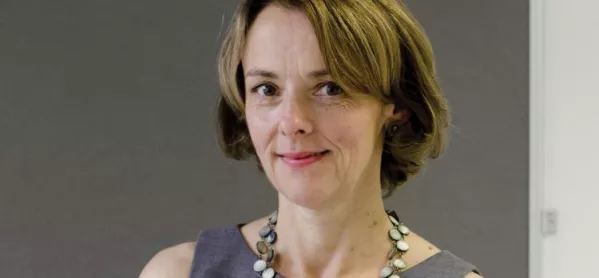Teaching is “brutal” and “hard in so many ways”, but there are joys that you never lose sight of, the founder of Now Teach has said.
Lucy Kellaway quit her job as a Financial Times columnist to begin a new career as a maths teacher in a challenging London secondary school in September. She set up Now Teach to encourage other middle-aged professionals to follow her into teaching.
Reflecting on her first few months in the classroom in The Times, she said that several Now Teach recruits have already dropped out, but the charity plans to expand its cohort next year and the year after.
In the article, Ms Kellaway says being a teacher has left her in a “permanent state of agitation that is oddly reminiscent of being in love”.
“I am wide awake before dawn, thinking obsessively about my lessons and new charges,” she writes.
“Instead of feeling useful, for large chunks of every day I feel useless. I am a dunce with the interactive smartboard that is the centrepiece of every modern classroom. I sometimes get so flustered I make mistakes in my sums in front of class.”
The “one thing” she is not useless at is “standing at the front of the class and talking”, though she has discovered this is only a “small part” of being a teacher and she feels she needs to get better at “learning how to shut up”.
Ms Kellaway says that in her few months in the classroom she has reappraised how difficult teaching is.
“Before I started, every teacher I came across issued the identical warning: this will be the hardest thing you have done,” she writes. “At the time I found this annoying… its being hard was part of the attraction. Who wants to coast through the last quarter of their working lives?
“Eleven weeks in and I’m changing my mind. Writing columns turns out to be a relative doddle… Teaching is hard in so many ways. There are at least a dozen roles you need to master - including performer, marshal, counsellor, clerical worker, mathematician, role model and nag - and you need to know exactly when and how to be which.”
Recruits ‘wobbling’
She reveals that two out of the original cohort of 47 Now Teachers have already given up.
“One told me that he felt lonely in the classroom and missed the teamwork of his old life,” she writes. “The other said that not only did he find teaching intolerably stressful, he despaired of it ever getting any better. He looked around at the young teachers in his school who all looked pale and shattered and thought: ‘I can’t do this.’”
She says a “couple more” recruits are “wobbling” and she is “watching them with anxiety”.
Despite this, Now Teach intends to recruit 80 trainees this year in London and Hastings, East Sussex, and it is planning to recruit twice as many the following year.
“To them, I am saying something that I am learning the hard way: teaching is brutal.”
Despite the difficulties, Ms Kellaway says that even in her “most painful moments” there are “joys of teaching that I never lose sight of”.
“The first is the students. For the first time in my working life, I’m doing something that is not about me. Teaching is about them. When at the end of the first half-term I watched the heads of my pupils bent in silence over their test papers, I felt a passionate involvement in their progress.”
Another is “the absence of boredom”. “Journalism is one of the most exciting jobs on earth, but even that is sometimes boring,” she says.
“Since September 1, I have not been bored for one second.”
Want to keep up with the latest education news and opinion? Follow Tes on Twitter and Instagram, and like Tes on Facebook




